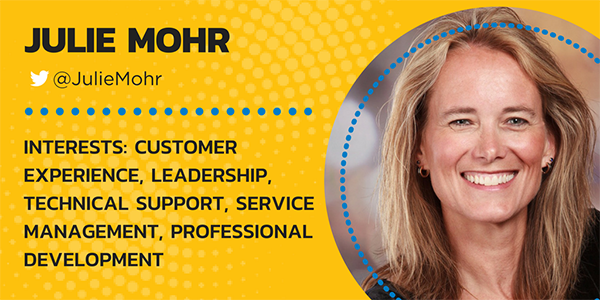Date Published November 30, 2017 - Last Updated December 6, 2017
In January 2017, HDI presented the Top 25 Thought Leaders in Technical Support and Service Management. To help you get to know them better and learn what it means to be a community leader, we’ve interviewed each of our thought leaders. Today, we hear from Julie Mohr.

Tell us about your day job and also how you are involved in the community.
One of the greatest strengths I have comes from diversity. Moving around both domestically and abroad as a military brat over decades provided ample opportunity for me to learn about people and cultures as well as gain skills and insights in jobs in many different vertical markets and industries. I enjoy different areas of study, theoretical practices, writing, speaking, and hobbies outside of work. I have been involved as a leader in ITSM, knowledge management, but also in my community serving as PTA president and committee chair on many different projects over the years. Diversity and exposure to many different environments provides ample opportunity to hone your skillset as well as prepare you for future unknowns. Over the years I have developed many different landing sites for my work, but recently did some rebranding. Most of my work is now centrally located at my website. There you will find the additional communities I contribute to including The Knowledge Culture (site dedicated to creating the right knowledge culture in organizations), Be-Significant (site dedicated to authentic leadership), The Authenticast (podcast with Eddie Vidal on Authentic Leadership), and my online training campus eLearning-Campus.com.
What motivates you to be active in the community?
As I am sure with others in the industry, I have an extreme drive to give back to the community that invested in my career and development. Education and instructional design is one way to create change and transfer knowledge and skills to students. Consulting and mentoring allows me to help customers with specific needs and problems. But when I can contribute back to the community through speaking and writing, this is where you can drive change through innovation and creative thinking.
What suggestions do you have for tech support professionals interested in getting more involved in the community?
I would seek out diversity in your personal as well as professional life. Many times, the skills that you learn in areas outside of technical support and service management help to drive your success in your career. I also recommend that when you face a problem that you not focus on a solution too quickly. Confidence comes from understanding your solution, but also why alternative solutions many not be as successful. Spend some time learning about other domains of knowledge outside of IT and see how you can apply what you have learned. One skill I wish I had learned and applied more often early in my career is the skill of listening. Podcasts provide a great opportunity to hear many different perspectives from experts around the world.
What trends do you anticipate for technical support as it relates to the business over the next few years?
The most significant trends we see today are the Internet of Things, the continued use of artificial intelligence and automation of business processes, and the continued disruption of existing industries. Organizations that do not handle organizational change well and are not thinking ahead of their customers are likely to fail those customers. Knowledge is the key to better understanding your customer's needs today and predicting what your customers will want in the future. If you are not focused on knowledge management today, then your organization will not be prepared for those future needs. We need to understand the complete customer experience and use the knowledge to innovate and disrupt our support model so that we meet the needs of our customers—not waiting until they complain to change. It will be interesting to see how that changes our existing support models.
Organizations that do not handle organizational change well and are not thinking ahead of their customers are likely to fail those customers.

Amy Eisenberg is the editor for HDI where she works with industry experts and practitioners to create content for technical support professionals. She has worked in B2B media and scholarly publishing for more than 20 years, developing content for print and digital magazines, print and email newsletters, websites, conferences, and technical seminars. Follow Amy on Twitter @eisenbergamy, and connect with her on LinkedIn.